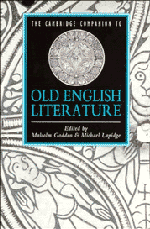Book contents
- Frontmatter
- 1 Anglo-Saxon society and its literature
- 2 The Old English language
- 3 The nature of Old English verse
- 4 The nature of Old English prose
- 5 Germanic legend in Old English literature
- 6 Heroic values and Christian ethics
- 7 Pagan survivals and popular belief
- 8 Beowulf
- 9 Fatalism and the millennium
- 10 Perceptions of transience
- 11 Perceptions of eternity
- 12 Biblical literature
- 13 Biblical literature
- 14 The saintly life in Anglo-Saxon England
- 15 The world of Anglo-Saxon learning
- Further reading
- Index
- Series List
2 - The Old English language
Published online by Cambridge University Press: 28 May 2006
- Frontmatter
- 1 Anglo-Saxon society and its literature
- 2 The Old English language
- 3 The nature of Old English verse
- 4 The nature of Old English prose
- 5 Germanic legend in Old English literature
- 6 Heroic values and Christian ethics
- 7 Pagan survivals and popular belief
- 8 Beowulf
- 9 Fatalism and the millennium
- 10 Perceptions of transience
- 11 Perceptions of eternity
- 12 Biblical literature
- 13 Biblical literature
- 14 The saintly life in Anglo-Saxon England
- 15 The world of Anglo-Saxon learning
- Further reading
- Index
- Series List
Summary
Most Old English poetry and a considerable amount of Old English prose is now accessible through Modern English translations. But in order to understand fully and appreciate the literature of the Anglo- Saxon period - its style, verse structure and content - it is necessary to read the texts in their original language. The following chapter is intended as an introduction to Old English, with emphasis on those characteristics and developments that distinguish this older stage of the language from Modern English. The chapter is not, however, meant as a grammar or work of reference, particularly since some simplification of the complex linguistic facts has been unavoidable. Some standard works on Old English language are listed below (Further reading, pp. 284-5).
For the speaker and reader of Modern English who is beginning to study Old English, texts written in that language may at first appear strange and somewhat difficult. This is due mainly to the momentous changes that English has undergone during the last nine hundred years of its development, particularly during the Middle English period (c. 1100- 1500), when the structure of English changed from that of an inflected language to one with hardly any inflexional endings, when sound changes affected the pronunciation and spelling of most of the vocabulary, and when this vocabulary became subject to almost revolutionary changes owing to the loss of a large number of older, native words and to the large-scale borrowing of words from other languages, especially French and Latin.
- Type
- Chapter
- Information
- The Cambridge Companion to Old English Literature , pp. 23 - 54Publisher: Cambridge University PressPrint publication year: 1991
- 4
- Cited by



